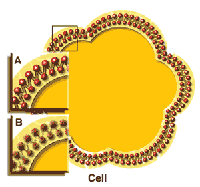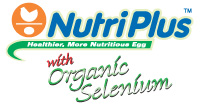Home >>
NutriPlus + Organic Selenium >> About
Selenium
NutriPlus with Organic Selenium
About Selenium
•
What Is Selenium?
•
Organic And Inorganic Selenium Explained
•
Why Does Our Body Need Selenium?
•
Why Does Our Diet Lack Selenium?
•
Why Add Selenium To Eggs?
•
Benefits Of Selenium
•
Recommended Selenium Intake
What Is Selenium?
Selenium (Se) is a trace mineral that is required by the human body
and is of fundamental importance in ensuring good health. Selenium
was discovered in 1817 by Jons Berzelius and takes its name from the
Greek word Selene (the goddess of the moon). Until recently,
selenium was a little-known trace mineral. International research on
Selenium has established that it is an essential component of the
human diet in the sustaining of good health and general well-being
because of its protective and preservative characteristics. It has
also been found that selenium deficiency may lead to increased
susceptibility to disease and ill health.
>> Back to top
| Organic And Inorganic Selenium Explained | |
| Selenium exists in two chemical forms in nature, Organic Selenium and Inorganic Selenium. Inorganic Selenium can be found in different minerals in the form of selenite, selenate and selenide as well as in metallic form. In contrast, in vegetable feed Organic Selenium is an integral part of amino acids. Therefore, in nature animals receive selenium mainly in the organic form. Research had shown that Organic Selenium is far more beneficial for us as our body absorbs and retain Organic Selenium at a better rate. | |
|
Organic Selenium vs Inorganic Selenium |
|
|
Organic Selenium |
Inorganic Selenium |
|
Exists in the form
of seleno-amino acids,
i.e. selenomethionine. |
Exists in the form
of mineral salt. |
|
Is actively absorbed by amino acid routes. |
Is passively absorbed from the small intestine. |
|
More Organic Selenium is retained by our bodies. |
Most of the unused Inorganic Selenium in our bodies
is excreted. |
|
Our tissues store Organic Selenium and hold it in
reserve for times of greatest need, such as during times of stress. |
Only a small amount of Inorganic Selenium finds its
way into body protein. |
|
Organic Selenium is retained by our body in useful
form. |
Inorganic Selenium is poorly retained. |
|
>> Back to top |
|
Why Does Our Body Need Selenium?
Selenium is a component of several antioxidant proteins such as
glutathione peroxidase, superoxide dismutase and catalase.
Antioxidants neutralize the toxic by-products of oxygen metabolism.
These by-products are known as free radicals which can cause damage
to cellular components including DNA. Antioxidants are essential to
human health as it helps protect against environmental carcinogens
and cardiovascular disease, protects our skin from solar ray damages
and may be important in fighting the effects of Alzheimer’s and
other age-related illnesses.
Glutathione Peroxidase (GSH-Px): Each molecule of
gluthathione peroxide contains four atoms of selenium. Thus selenium
is a key component of the body's defence against the degenerative
effects of age and exposure to toxic free radicals.
Superoxide Dismutase: An enzyme that destroys the
superoxide radical
Catalase: An enzyme that produces Vitamin E, a general
antioxidant.
>> Back to top
Why Does Our Diet Lack Selenium?
The selenium content in food is becoming a health issue as the
average levels of selenium in our diets have fallen and is well
below the amounts recommended for optimum health.
The lower availability of selenium in our diets can be attributed to
low soil selenium levels or low selenium absorption in crops that
are cultivated in acidic and poorly aerated land. Faster growing
crop varieties and less root development reduces the opportunity for
such crops to accumulate selenium from the soil. Also, increased
crop density and yield has lead to minerals in agricultural land to
diminish faster.
>> Back to top
Why Add Selenium To Eggs?
As eggs are a regularly consumed item in our diets, they would be an
ideal food source of Selenium for our bodies. Although Selenium is
not readily absorbed into eggs, the American company
Alltech
Biotechnology has developed a special feed which can
increase the level of Selenium in broilers and layers, and
consequently the eggs. This feed had the approval of the US Food and
Drug Administration body (FDA). As the recommended daily amount
(RDA) of Selenium intake for our diets in estimated to be 75ug by
nutritionists, the consumption of two NutriPlus Enriched with
Organic Selenium eggs a day, which contains 22 micrograms of
Selenium per egg, will be sufficient.
>> Back to top
Benefits Of Selenium
• Cancer prevention
Selenium, a trace mineral essential in ensuring good health, has
also been found to be an effective weapon against cancer.
The human body is made up of trillions of cells. These cells are
supposed to multiply in orderly manner to replace old and worn-out
cells with new cells. But the human body also produces free radicals
to generate energy and destroy bacteria.
Daily exposure to
pollution sources such as exhaust fumes, cigarette smoke as well as
solar rays causes the body to produce excessive free radicals.
This can lead to damage to the cell and the DNA within it, causing
the cell to multiply uncontrollably, thus triggering the development
of cancerous cells.
Free radicals also suppress the body's
natural immune system, reducing the body's ability to detect
defective cells before they develop into tumours.
The level
of free radicals in our body can be controlled and maintained by
antioxidants. Antioxidants inhibit the oxidation process in the cell
caused by free radicals, thus reducing oxidation damage to our
cells.
Selenium is an excellent antioxidant and an essential
component of glutathione peroxidase (GSH-Px), which neutralises
toxic peroxide produced during normal metabolism.

A: Antioxidants protect the cell against damage by
free radicals, and the cell's vital parts remain unharmed.
B: The cell membrane is attacked and oxidised by free radicals,
causing the cell to be weakened.
Glutathione
peroxidase, along with selenium, is crucial for the body in its
fight against cancer. However, the level of gluthathione peroxidase
is reduced with advancing age as well as by consuming drugs, alcohol
and high-fat/low-fibre diet.
Selenium works more effectively
in combination with other antioxidants like vitamin E. Vitamin E,
taken with selenium enhances Selenium's anti-tumour and antioxidant
properties.
The selenium-cancer reduction link was first
discovered in the late 1960's.
Quoting Dr Margaret Rayman of
the University of Surrey (UK): "Hundreds of studies have been
conducted to investigate the effect of selenium on cancer prevention
during recent years. The vast majority of the studies have shown
highly positive effects of selenium on various types of cancer in
humans."
Dr. Larry Clark, from the Arizona Cancer Centre,
found from his studies that selenium supplements reduced the risk of
lung cancer by 46%, colon cancer by 58%, and prostate cancer by 63%,
with an overall reduction of 37% in all types of cancers. It also
showed a 50% reduction in cancer mortality.
• Immune System
Selenium supplements, it is able to protect against oxidative
damages to the RNA virol genome. Selenium also plays a key role in
the functioning of the immune system as it increases the number of
interleukin-2 (IL-2) receptors on the surface T-cells. T-cells do
the actual killing of invading pathogens. IL-2 is a hormone like
substance that stimulates T-cells to proliferate and function.
Recent studies on viruses by Beck and co-workers have shown that in
a body with selenium deficiency, harmless viruses can become
virulent. But with selenium supplements, it is able to protect
against this development of virulence, which is believed to be the
result of oxidative damages to the RNA virol genome.
•
Fertility
Selenium is essential for male
fertility, as it is required for testosterone biosynthesis and for
the normal development of spermatozoa. Recent studies with sperm
have revealed two sperm specific selenoproteins. One of it is
glutathione peroxidase which is specific to the sperm nuclei, and
the other is found in the mid-piece where it is believed to have an
enzymatic and structural function. It is found that immobility in a
sperm is frequently a result of “snaps” in the mid-piece region. The
table below shows the result benefits in sperm quality where there
was an increased paternity rate of 11% in the group given selenium
supplement versus 0% in the group that was given a placebo.

• Brain
Selenium plays an important role in the manufacture of a brain
chemical known as a neurotransmitter and a low level of selenium is
linked with an increased risk of dementia and senility. According to
studies done, loss of brain function was found to be two folds
faster in those above 65 with selenium deficiency in their diet.
Other cognitive degeneration afflictions associated with Selenium
deficiency include Parkinson's and Alzheimer's diseases. Studies
done by University of Wroclaw, Poland have found that supplementing
Alzheimer’s patients with selenium everyday slowed the progression
of the disease.
•
Cataracts
Selenium may help to protect
the eye against free radical damage, which is a root cause of
cataracts.
•
Arthritis
In addition to being an antioxidant, selenium is also an
anti-inflammatory agent. Selenium can help fight the free radicals
that promote inflammation and degrade cartilage and collagen in
joints. Surveys of patients with rheumatoid arthritis have indicated
that they have reduced selenium levels in their blood.
• Mood
Depression and irritability could be caused by selenium
deficiency in our diet. Margaret Rayman of the Center for Nutrition
and Food Safety at the University of Surrey, UK reported in The
Lancet 2000 that there are a number of studies indicating beneficial
effect of selenium on mood. Low selenium was associated with
increased levels of depression, anxiety, confusion and hostility.
While high dietary selenium or supplementation with selenium appears
to improve mood.
• Aging
Selenium as an antioxidant may slow down the aging process. Aging is
a process of bodily wear and tear that occurs throughout a lifetime.
One well-respected theory defines aging as the result of healthy
cells being damaged by free radicals. Our body generates free
radical quenchers (antioxidants) to stabilize the free radicals.
However, if our bodies do not produce enough antioxidants to stanch
free radical damage, the damage accumulates and fast forward the
aging and disease.
>> Back to top
| Recommended Selenium Intake | |
| For males and females above the age of 19, the recommended dietary allowance is 70 micrograms and 55 micrograms respectively. The requirements may be increased to 65 micrograms for pregnant females and 75 micrograms for lactating females. | |
| Recommended Selenium Intake | |
|
Infants |
|
| 6 months |
10 ug |
|
6 to 12 months |
15 ug |
|
Children |
|
| 1 to 6 years |
20 ug |
|
7 to 10 years |
30 ug |
|
Adult Males |
|
| 11 to 14 years |
40 ug |
|
15 to 18 years |
50 ug |
|
19+ years |
70 ug |
|
Adult Females |
|
| 11 to 14 years |
45 ug |
|
15 to 18 years |
50 ug |
|
19+ years |
55 ug |
| Pregnant Females |
65 ug |
| Lactating Females |
75 ug |
|
*Source: Recommended Dietary Allowances, National Academy of Sciences. (ug = micrograms) |
|
|
>> Back to top |
|
